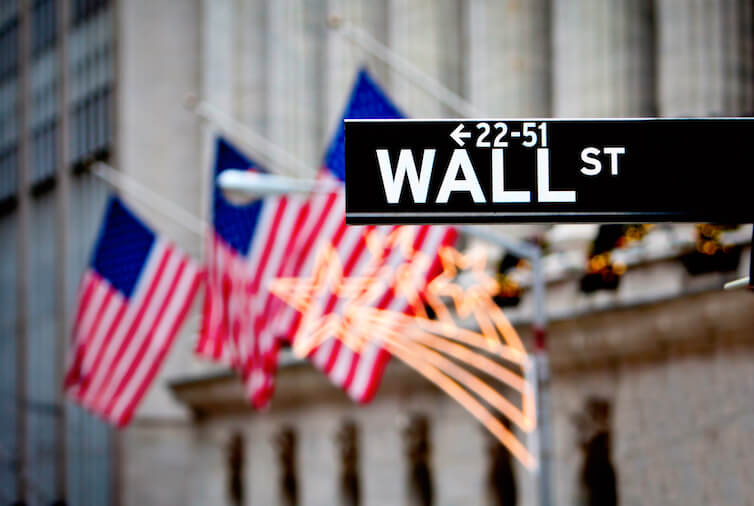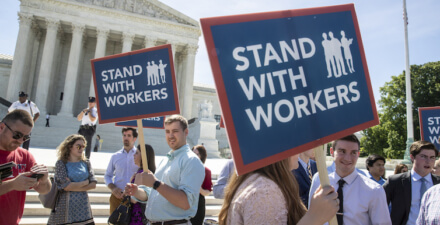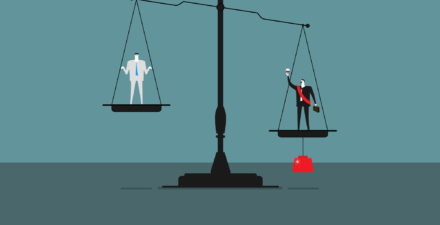The political influence and preferences of the U.S. economic elite
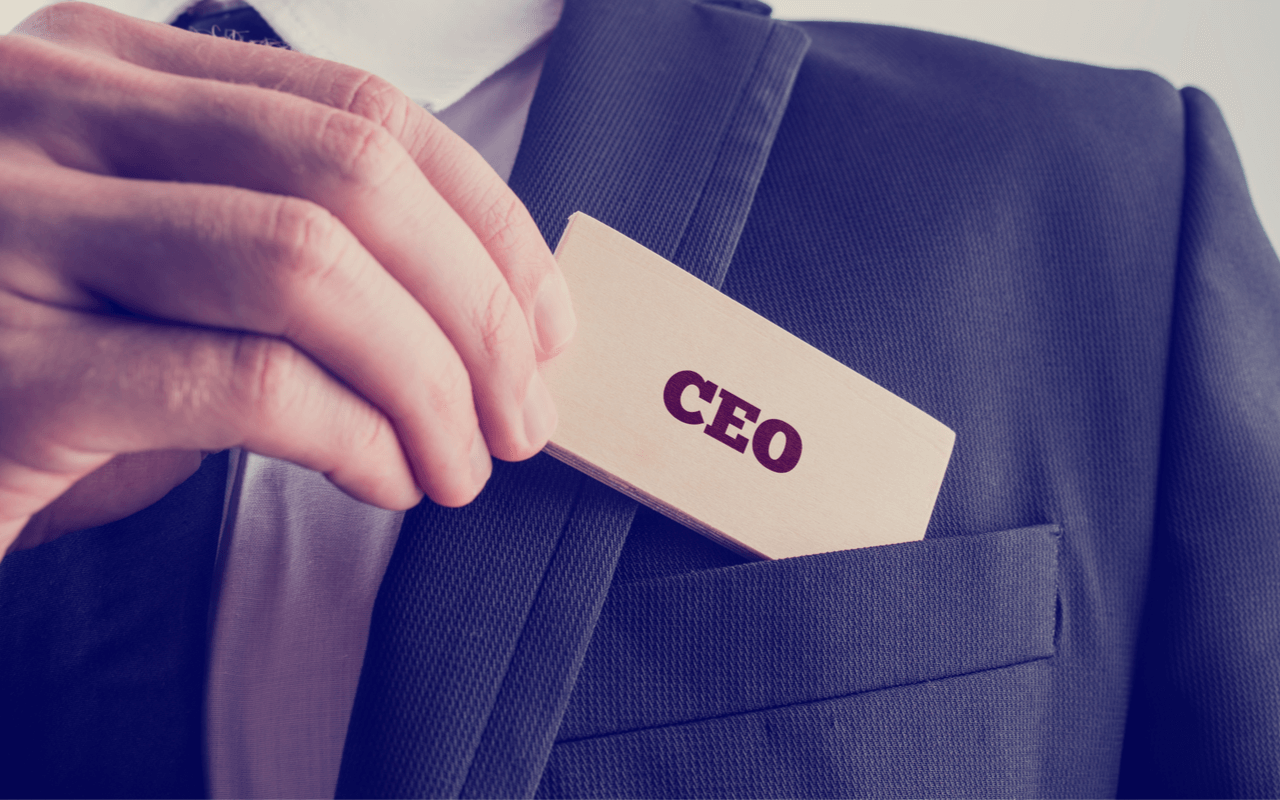
With economic resources increasingly concentrated the top of the wealth and income ladders in the United States, the political power to influence and make policy increasingly resides with a tiny minority of people who are accruing the most from U.S. economic growth. A recent paper adds to our understanding of the political preferences of those at the top and how they might influence policy, by presenting empirical evidence on the partisan leanings of U.S. public-company chief executive officers. The results show that CEOs disproportionately display pro-Republican preferences.
The authors—Alma Cohen of Harvard Law School and Tel Aviv University, Moshe Hazan of Tel Aviv University, Roberto Tallarita of Harvard Law School, and David Weiss of Tel Aviv University—use Federal Election Commission records to look at the political contributions of more than 3,800 individuals who served as CEOs of companies included in the S&P Composite 1500 index during the 18-year period of 2000 to 2017.
The authors find that more that 57 percent of CEOs are Republicans, 19 percent are Democrats, and the rest are neutral. CEOs are classified as Republicans if they contribute at least two-thirds of their donations to Republican candidates, as Democrats if they contribute at least two-thirds of their donations to Democratic candidates, and neutral if they split their financial support among the two major parties. The median CEO directs 75 percent of their total contributions to Republicans. The pattern is consistent over time: Republican CEOs substantially outnumber Democratic CEOs in each year of the 18-year period that is studied. (See Figure 1.)
Figure 1
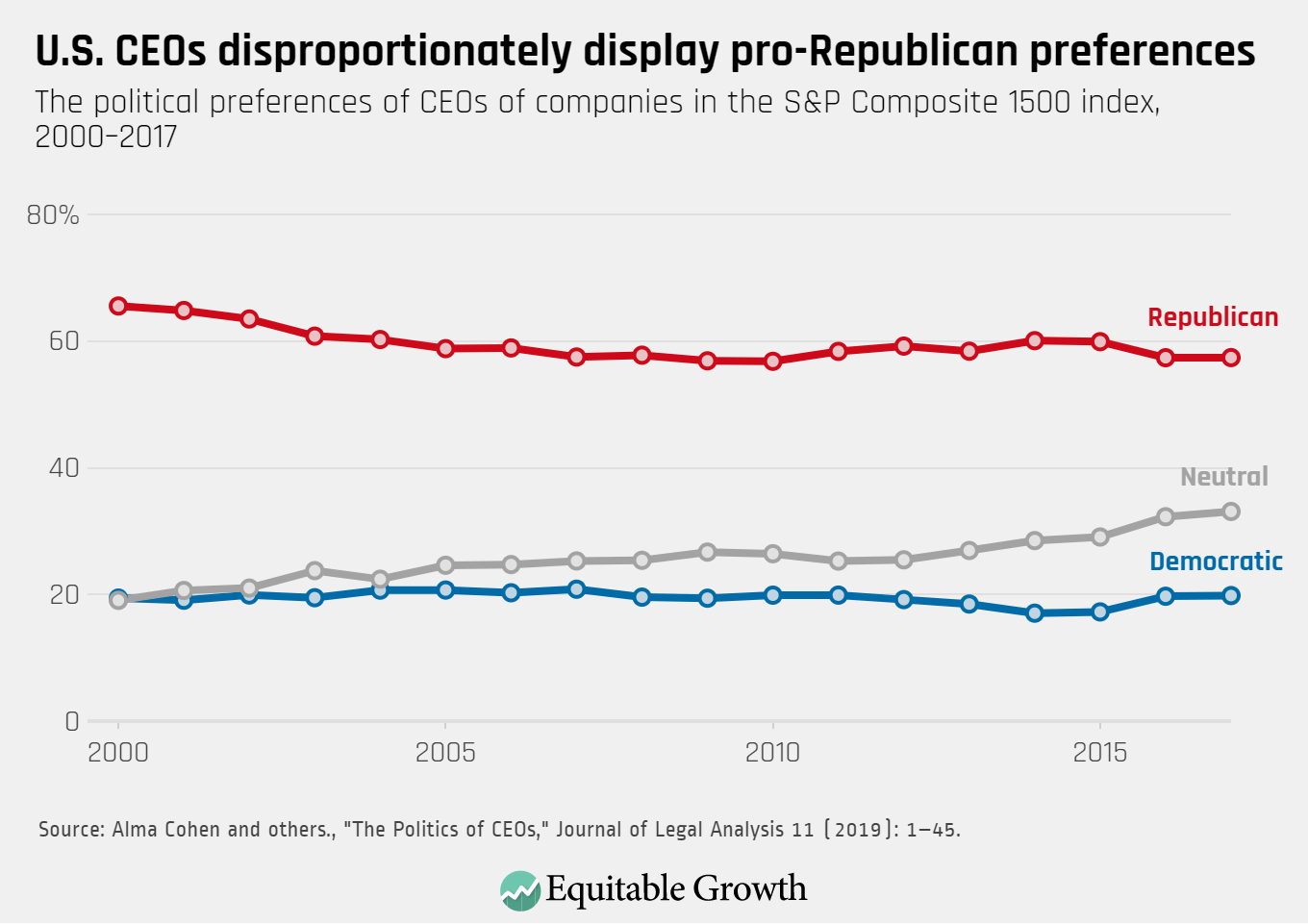
Why is it important to understand the political preferences of CEOs? The heads of S&P Composite 1500 companies are an extremely small group, accounting for less than 0.001 percent of U.S. voters. They do, however, wield a very high degree of influence over policymaking and politics in the United States through corporate political spending and policy activism.
First, CEO preferences are a window into corporate political spending, which is highly influential especially since the Supreme Court’s decision in Citizens United v. Federal Election Commission, which allowed corporations to make unlimited independent political expenditures. Public companies are generally not required to disclose their political spending to their investors, and although direct contributions must be reported to a federal or state agency, information is scattered among hundreds of filings. Corporations can also make donations through intermediaries.
Public companies make up less than 0.1 percent of the total number of U.S. firms but account for more than 30 percent of private-sector employment and more than 50 percent of pretax profits. The four co-authors note that directing even a tiny fraction of corporate profits to politics has the potential to make a huge impact. In 2017, S&P 1500 companies had aggregate profits of $1.2 trillion. Using just 0.1 percent of these profits for political spending would direct $1.2 billion into the political process. For comparison, the two major presidential candidates in the 2015–2016 cycle raised a combined total of $1.2 billion.
Second, CEOs express views and provide advice on policy—both individually and through their most prominent association, the Business Roundtable. About 200 CEOs of leading companies are part of the Business Roundtable, which was created to formulate and advocate policy views and does so successfully. In the runup to the passage of the 2017 tax law, for example, the organization persuaded lawmakers to repeal the corporate alternative minimum tax, a measure designed to ensure that each corporation paid at least some minimum amount of tax. CEOs also express opinions on issues unrelated to their companies’ core business, such as LGBTQ rights, race relations, and climate change.
CEOs also occupy a privileged position as advisers to policymakers at the highest levels. President Donald Trump created an advisory committee, appointing 16 CEOs of large public companies to advise him on business regulation and economic policy, and another advisory council to advise him on manufacturing growth. President Barack Obama’s Economic Recovery Advisory Board and Council on Jobs and Competitiveness included prominent CEOs tasked with providing “nonpartisan” advice.
Turning back to the research findings of the paper, Republican leanings among CEOs hold even when their preferences are disaggregated by industry sector, region, and gender. Dividing the companies into 12 industry sectors, the authors find that each sector shows a pro-Republican imbalance, with considerable variation across industries. The energy sector is composed of almost 90 percent Republicans and 5 percent Democrats. Manufacturing and chemicals also lean heavily Republican, while business equipment and telecoms have the lowest Republican-Democrat ratio, at 1.6.
By region, pro-Republican preferences are strongest for CEOs of companies headquartered in the Midwest and the South. These preferences are the least strong for CEOs of companies in the Northeast and West. (See Figure 2.)
Figure 2
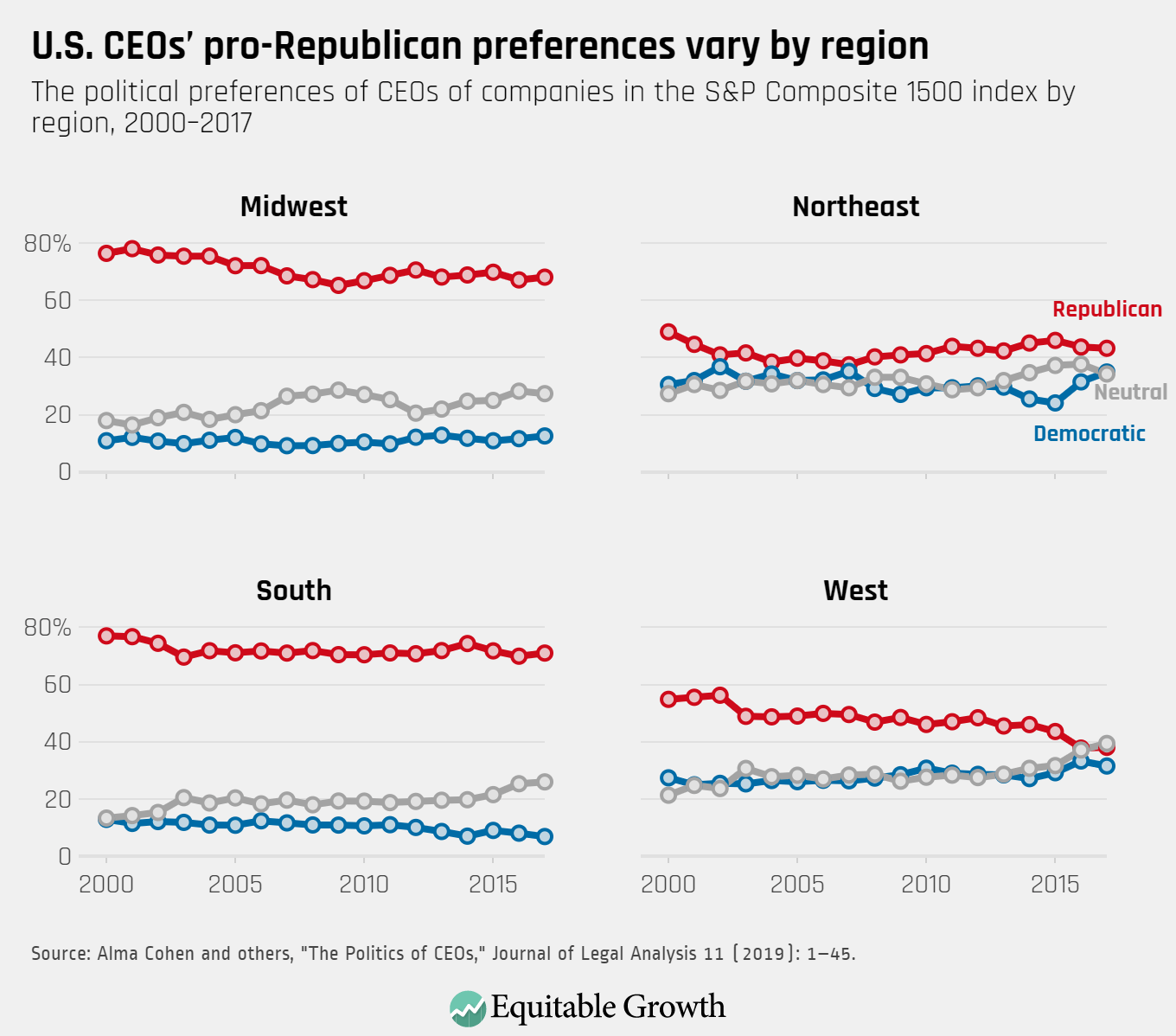
The gender of chief executives also is significantly associated with partisan preferences. There is a clear pro-Republican tilt characterizing the male CEOs but not the female CEOs, who make up only 2.8 percent of the group. Male Republican CEOs are more than three times as numerous as male Democratic CEOs, while female Republican CEOs outnumber female Democratic CEOs by a ratio of just 1.1. The pro-Republican tilt among male CEOs is strong and consistent throughout the entire period, whereas it is much more variable for female CEOs, with Democrats outnumbering Republicans in some years. (See Figure 3.)
Figure 3
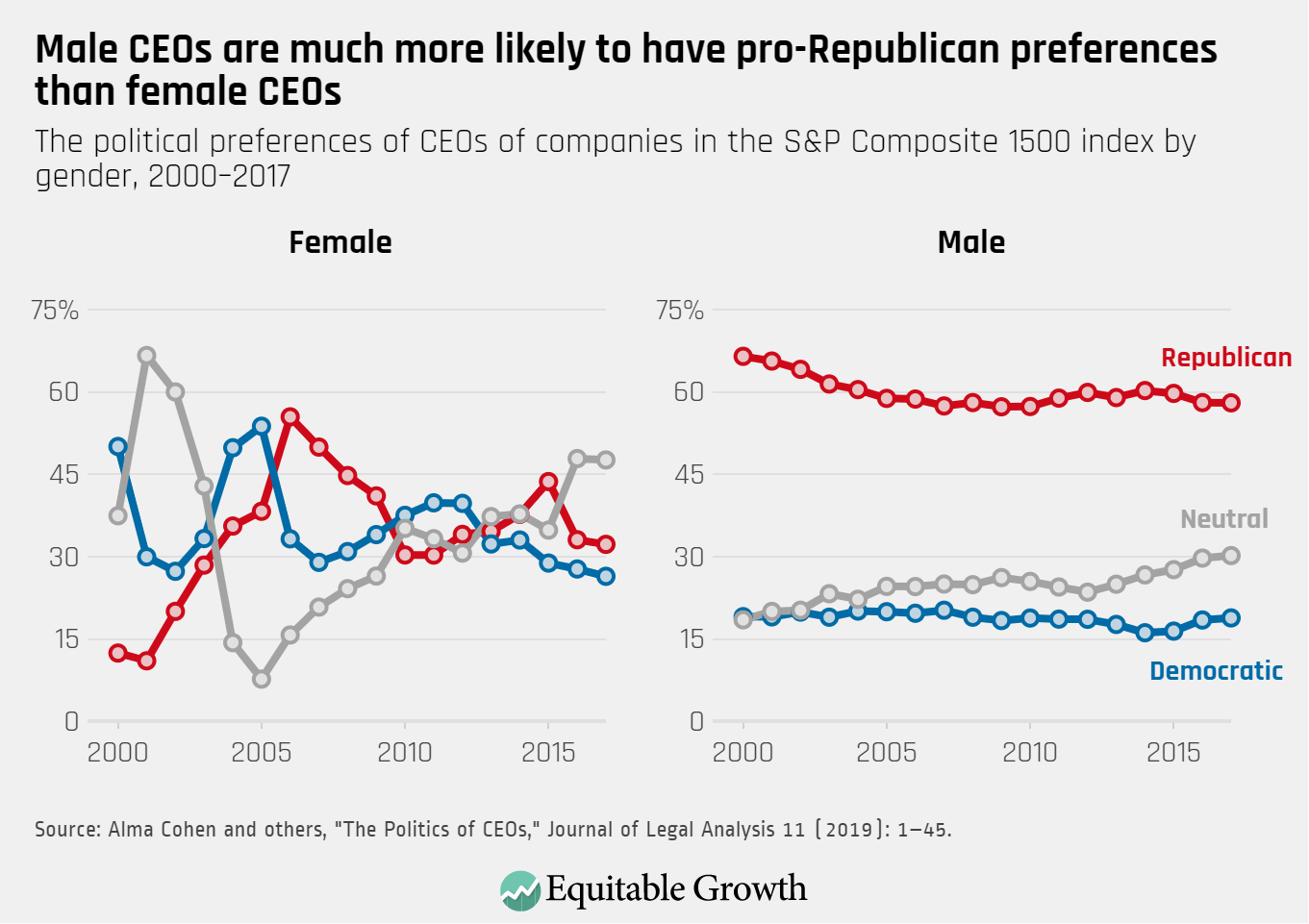
This research on the political preferences of U.S. CEOs adds another layer to our understanding of how economic inequality subverts our democracy and the public institutions and the policymaking process we need to support the U.S. economy—laid out by Equitable Growth President and CEO Heather Boushey in her new book, Unbound: How Inequality Constricts Our Economy and What We Can Do About It.
A booming political science literature documents how those at the top of the wealth and income distribution are more able than the rest to get their interests heard in the political process and set the political agenda. Policies supported by the rich are two-and-a-half times more likely to pass than those not supported by the rich. And political campaign contributions largely nudge out candidates to the left and even in the center. Further, corporate money is pervasive throughout the U.S. political system, seen through the many lobbyists working on Capitol Hill and even through charitable donations made by corporations.
U.S. CEOs and the few others at the top use their political influence to eliminate regulations and reduce taxes—thereby eroding the ability of public institutions to do essential functions and make critical public investments that benefit the overall economy. By subverting our economy in various ways, economic inequality undermines confidence that institutions of governance can deliver for the majority. Inequality in wealth and power is thwarting the government from taking on collective endeavors that provide the foundation for strong, stable, broad-based growth, while promoting the interests of the economic elite over others.


